 Your new post is loading...
 Your new post is loading...

|
Scooped by
nrip
|
Saudi Health Minister Tawfiq Al-Rabiah said digital health technologies will play a central role in the transformation of health services. He was inaugurating the HIMSS event in Riyadh, which aims to raise awareness about the importance of e-health care and its role in improving performance, services and the use of resources in the health sector. Addressing the opening session, Al-Rabiah said digital health technologies will play a central role in the transformation of health services envisioned by the Health Ministry. A large part of the Kingdom’s Vision 2030 reform plan focuses on health issues, he added. “E-health will be an essential part of this transformation, and will support it so as to contribute significantly to the improvement of health services and streamline access to such health services,” he said. The Mawid app, which was presented during the inaugural session, is a centralized system that enables patients to book appointments in Primary Healthcare Centers (PHCs) in coordination with the relevant department, Al-Rabiah added. Through the app, patients can book, amend or cancel their appointments at any hospital to which they were referred, and rate the quality of services provided, he said. Another app, Seha, provides an online medical consultation service through doctors accredited by the Health Ministry, he added. Patients can get these consultations via chat, voice or video calls, and evaluate their experience at the end of the consultation, said Al-Rabiah, adding that the ministry is developing electronic medical prescriptions. “I think artificial intelligence (AI) will play a huge role in the development of health services in the coming years,” he said, adding that the ministry will include AI services in Seha. Based on experiences outside the Kingdom, AI gives better results than visiting a physician, Al-Rabiah said. “We appreciate the pivotal role of the physician, which is indispensable, but this technique will reduce pressure on the physician and facilitate access to health services in common diseases,” he added. Al-Rabiah reviewed an app that remotely and promptly interprets X-ray images, which is already being used in four hospitals. AI will be introduced to make readings more in-depth and accurate, he said. Al-Rabiah stressed the need to train and qualify health practitioners to use these new techniques, and thanked the SCHS for making such training a prerequisite for obtaining a health practice license. “The future is brighter with the use of technologies in health services, and the Kingdom will be a leader in this field,” he said.

|
Scooped by
nrip
|
Text Messaging (SMS) technology is widely adopted in developing countries. Text message-based health surveys distributed to 6,694 Liberians during an Ebola outbreak were generally on par with baseline demographic data collected in a prior household survey, according to a study recently published in Nature Digital Medicine. Further, the text surveys suggested that women sought fewer hospital-based deliveries during the outbreak, a trend consistent with other retrospective studies that have been published since the outbreak. The Ebola outbreak was, and in some areas continues to be, a test of public health infrastructure. In regard to maternal care in particular, the researchers noted that many communities perceived a reduction in care quality as practitioners were advised not to make physical contact patients espousing fluids whenever possible. As such, a viable, real-time data collection system that is based on a technology widely adopted by residents can be a substantial boon to health systems facing crisis, Why it matters Taken together, these findings would indicate that these text-based surveys could be an avenue toward more real-time data collection in developing countries gripped by outbreaks. for more, read the original unedited article at https://www.mobihealthnews.com/content/text-based-survey-offers-accurate-real-time-health-info-during-ebola-outbreak-study-says

|
Scooped by
nrip
|
Like recent Brazilian investment booms focused on fintech innovation and new on-demand business models, there’s been a recent explosion in healthtech startups in Brazil. About 75 percent of Brazil’s population (approximately 150 million people) only have access to the public healthcare system, which is poorly managed and inefficient. Often times, to schedule a single consultation or exam, a patient needs to wait weeks or even months to see a care provider. Technology-driven startups are springing up to address better, more efficient access to healthcare for a large and aging population. To help make healthcare advice, diagnosis and monitoring more accessible, telehealth services in Brazil are expanding. Like many industries, AI and data analytics are transforming healthcare in Brazil and beyond from improving the speed of patient diagnoses to managing healthcare costs. Last year, the Brazilian government launched a project to modernize patient records for more than 42,000 public health clinics across the country by the end of 2018. This digitization of records is estimated to save the federal government about $6.8 billion according to The World Bank. As of late last year, only 30 million Brazilians (out of 208 million) had electronic medical records (EMR), and nearly two-thirds of the family clinics in Brazil didn’t have any way of recording digital information about their patients. Another major issue caused by a lack of digitization is that close to 70 percent of medical prescriptions in Brazil have potential for errors, according to the World Health Organization. As a result, Brazil has thousands of deaths per year linked to medication errors. A good number of them could be avoided by scanning. In the U.S., more than 77 percent of prescriptions are already done digitally. Certainly, healthtech startups in Brazil have emerged as a sector to watch, and we’re only at the tip of the iceberg in terms of problems in the country to be addressed by healthtech innovation. The key ingredients to create another boom sector like fintech in the region are abundant. Healthtech in Brazil will surely remain a hot spot for entrepreneurs, and the investors who believe in them, for many years to come.

|
Scooped by
nrip
|
Healthcare organisations are a major target for cyber criminals – and the consequences are huge. How can attacks be stopped? The last five years has seen a surge of attacks on the healthcare industry, with the largest breaches impacting as many as 80 million people. In July this year, it was revealed that 150,000 NHS patients' data was shared over a three-year period following a major breach. Over in the US, the 2015 cyber-attack on Anthem saw hackers steal 78.8 million patient records, claiming highly sensitive data, including names, social security numbers, home addresses and dates of birth. Meanwhile, this year, hackers breached the Singapore government’s health database with a targeted cyber-attack, accessing the data of 1.5 million patients. Healthcare breaches are especially serious because personal data can, in some cases, mean the difference between life and death. For example, says Carlisle, it could cause medications to become mixed up – or people might fail to get treatment for conditions such as diabetes. Healthcare providers often struggle to find room in tight budgets to invest in new IT systems, leaving them vulnerable. “Compliance issues are commonplace in healthcare too, where organizations need to meet stringent requirements of governing bodies such as HIPAA While network and endpoint technologies are a required element of an organization’s IT security stance, they are increasingly less effective at keeping external attacks at bay, They are also an inadequate way of securing cloud, big data, internet of things (IoT) and container deployments. The critical nature of healthcare environments means users require immediate access to healthcare data across a range of devices and applications. Therefore, Security can often be seen as a barrier rather than an enabler. It’s integral that healthcare organizations bolster their data security and compliance efforts. Data should be encrypted so it would be “worthless” in the event of a cyber-attack. The good news is that healthcare data breaches are now in the consumer collective consciousness – and organizations are more aware than ever of potential data misuse.

|
Scooped by
nrip
|
Deep learning is helping to make prosthetic arms behave more naturally. Each year, more than 150,000 people have a limb amputated after an accident or for various medical reasons. Most people are then fitted with a prosthetic device that can recognize a limited number of signals to control a hand or foot, for example. But Infinite Biomedical Technologies, a Baltimore startup company and another firm are taking advantage of better signal processing, pattern recognition software and other engineering advances to build new prosthetic controllers that might give amputees an easier life. The key is boosting the amount of data the prosthetic arm can receive, and helping it interpret that information. “The goal for most patients is to get more than two functions, say open or close, or a wrist turn. Pattern recognition allows us to do that,” says Rahul Kaliki, CEO of Infinite. “We are now capturing more activity across the limb.” Kaliki’s team of 14 employees are building the electronics that go inside other companies’ prosthetic arms. Infinite’s electronic control system, called Sense, records data from up to eight electrodes on his upper arm. Through many hours of training on the company’s tablet app, the device can detect the intent encoded in Rubin’s nerve signals when he moves his upper arm in a certain way. Sense then instructs his prosthetic hand to assume the appropriate grip. read the original unedited story at at https://www.wired.com/story/bionic-limbs-learn-to-open-a-beer/

|
Scooped by
nrip
|
Information technology has allowed much of our economy to automate processes. We have seen transformations of the airline, banking, brokerage, entertainment, lodging, music, printing, publishing, shipping and taxi industries through the availability of massive volumes of real-time price and service data. Across America, consumer-facing retail service continues to shift to a virtual environment. Healthcare is the exception. Many health information technology (health IT) products initially focused on billing. The misalignment between billing support and the sense that these tools do not materially automate clinician work to build in efficiencies or improve workflows adds to an overall frustration with the increasing amount of time providers spend at their screens. Automation is hard because it tends to require interfaces of various types – both to other machines (Internet of Things) and to humans. Often automation proposals involve solutions that focus on highly structured data. But, someone or something has to put energy (physician salary, for example) into organizing much of this information, assuming it is even knowable. The underlying disease or patient behavior (e.g., smoking) is also often not knowable. And, automation relying on machine to machine interfaces regularly runs into a lack of application programming interfaces (APIs) supporting complex clinical data flows. I posted this week old piece now and now when it was published as #NHITWeek is this week. A lot of posts this week deal with possibilities and problems with healthcare focussed automation. The original unedited piece can be read at https://www.himss.org/news/healthcare-automation-transforming-medicine
|

|
Scooped by
nrip
|
- The world's largest technology companies have all hired well-known cardiologists.
- Heart disease and high blood pressure affect a large number of people, are well-understood, and there's evidence that consumer products can help.
Big Silicon Valley companies have often competed for talent with specialized skills, like expertise in artificial intelligence or trendy new programming languages. Now they're competing for heart doctors. Apple, Alphabet, and Amazon have all hired well-known cardiologists. This might just be a coincidence. Cardiologists tend to be well educated and hard working, and big tech companies have a track record of recruiting such people. In recent years, all of these companies have started to invest in products and devices that are targeted to millions of people who could benefit by tracking their heart health. Apple's smartwatch now includes an electrocardiogram, which can detect heart rhythm irregularities. Verily's study watch, which is designed for clinical trial research, also tracks heart rate and heart rhythm, and it's doing a lot of work in chronic disease management. So the more likely explanation is that tech companies are interested in health care, and they have all come to the conclusion that cardiology should be an early (if not initial) target. Here's why. It's a huge potential market Heart disease is the No. 1 killer in the world, and strokes are among the leading causes of death. And that's not all that cardiologists treat. "Our scope covers other common disease such as high blood pressure, which impacts about a third of people in the U.S. — 75 million Americans — as well as lipid and cholesterol disorders," said Dr. Mo Elshazly, a cardiologist and assistant professor of medicine at Weill Cornell Medicine. Many cardiologists are also experts in nutrition and exercise science, which impacts a huge number of people who are committed to staying healthy. That's useful for the teams within the largest tech companies that are more focused on wellness and fitness applications, rather than on health and medical. Alphabet has Google Fit. Apple has a fitness group for its Apple Watch. And Amazon is looking at health and wellness applications for its Alexa voice assistant. It's well-studied Cardiology is among the most-studied fields in medicine, meaning there's already a lot of evidence to understand the root causes of heart disease, as well as how to prevent it. That's attractive for tech companies, which tend to base their development decisions on data. Their consumer products are already making a difference Let's take Apple, as an example. The company launched its first Apple Watch model with a heart rate sensor, never expecting that people would use it to discover they were pregnant, at risk for a heart attack or experiencing a dangerous irregular heart rhythm. But as people began sharing examples of how the Apple Watch saved their life, the company started to invest heavily in the science and technology to drive more of these stories. A lot of that work culminated in the first-ever clearance for a heart rhythm sensor called an ECG for Apple Watch earlier in the summer. read more at https://www.cnbc.com/2018/10/17/what-every-tech-company-needs-a-cardiologist.html

|
Scooped by
nrip
|
Cybersecurity attacks on Healthcare and Public Health (HPH) critical infrastructure, such as healthcare delivery organizations (HDOs), are occurring with greater frequency. Disruptions in clinical care operations can put patients at risk. Securing critical infrastucture is a shared responsibility across many stakeholders, and with respect to medical
devices the primary stakeholders are FDA, Medical Device Manufacturers (MDMs), and HDOs. A common preparedness and response challenge FDA heard from its stakeholders in the aftermath of the aforementioned attacks is that - HDOs did not know with whom to communicate (e.g. MDM-HDO interactions);
- what actions they might consider taking;
- and what resources were available to aid in their response.
Without timely, accurate information and incorporation of medical device cybersecurity into their organizational emergency response plans, it was difficult for HDOs to assess and mitigate the impact of these attacks on their medical devices. To address this unmet need, the MITRE team (with the support of FDA), engaged with a broad distribution of stakeholder groups to understand the gaps, challenges, and resources for HDOs participating in medical device cybersecurity preparedness and response activities. Their efforts resulted in the creation of this playbook that may serve as a resource for HDOs. The playbook provides a stakeholder-derived, open source, and customizable framework that HDOs may choose to leverage as a part of their emergency response plans in order to ultimately limit disruptions in continuity of clinical care as well as the potential for direct patient harm stemming from medical device cyber security incidents. The link to the PDF of the first version of the playbook -> https://www.mitre.org/sites/default/files/publications/pr-18-1550-Medical-Device-Cybersecurity-Playbook.pdf

|
Scooped by
nrip
|
A national network of “disease detectives” has cracked the complicated medical mysteries of more than 130 patients with rare, previously unidentified diseases, though the bulk of the cases that come to them remain unsolved, according to an analysis of the network released Wednesday. The Undiagnosed Diseases Network — which now has 12 clinics nationwide, including one at Stanford — has a solve rate of about 35 percent, according to the analysis, published in the New England Journal of Medicine. Considering that all of the cases the network investigates involve patients with extremely complex conditions for which they’ve gone years — sometimes decades — without a diagnosis, that’s an impressive outcome, said the authors of the report. Most patients were diagnosed after a thorough analysis of their genome revealed a rare genetic mutation. Some were diagnosed only after the network was able to find just one or two other patients in the world with similar symptoms who had gotten a diagnosis. If doctors can access previous research that has connected certain symptoms with specific parts of the genome, that can at least give them a clue of where to look for a diagnosis. The Undiagnosed Diseases Network, which often relies on genome sequencing to diagnose patients, could be a major contributor to that greater understanding the original unedited story : https://www.sfchronicle.com/health/article/Disease-detectives-crack-cases-of-130-13297547.php

|
Scooped by
nrip
|
Studies show that Cognitive Behavior Therapy for Insomnia (CBT-I) delivered digitally through mobile phone apps is effective in treating insomnia. Like a real therapist, the apps that use Cognitive Behavior Therapy for Insomnia (CBT-I) also provide practical tools to help the user worry less about their sleep and over time, be less anxious and more confident about their ability get a good night's rest. It's very similar to what physicians do face-to-face with patients, And a recent study of Sleepio by Ong and the team that developed the product found that participants who used the product reported an improvement in insomnia symptoms and overall wellbeing. However, these apps don't work for everyone. The recent study hints at why. Less than 50 percent [of people who were assigned to use the app in a randomized controlled trial] are able to make it through the entire course of CBT delivered through digital platforms, For some people it may be hard to make it through all the sessions of CBT. This is true of most health and wellness apps. In other studies it has been found that of the 10,000 mental health apps out there, very few are actually being used. We dont really understand how people are using technology towards their health and recovery, But in some ways, he says, people with insomnia may be ahead of scientists in figuring out what works well for them. read the original unedited piece at https://www.npr.org/sections/health-shots/2018/10/08/654883409/some-apps-may-help-curb-insomnia-others-just-put-you-to-sleep

|
Scooped by
nrip
|
Roughly 600,000 people in the U.S. are diagnosed with Parkinson’s every year, contributing to the more than 10 million people worldwide already living with the neurodegenerative disease. Early detection can result in significantly better treatment outcomes, but it’s notoriously difficult to test for Parkinson’s. Tencent and health care firm Medopad have committed to trialing systems that tap artificial intelligence (AI) to improve diagnostic accuracy. They announced a collaboration with the Parkinson’s Center of Excellence at King’s College Hospital in London to develop software that can detect signs of Parkinson’s within minutes. (Currently, motor function assessments take about half an hour.) This technology can help promote early diagnosis of Parkinson’s disease, screening, and daily evaluations of key functions. Medopad’s tech, which uses a smartphone camera to monitor patients’ fine motor movements, is one of several apps and wearables the seven-year-old U.K. startup is actively developing. It instructs patients to open and close a fist while it measures the amplitude and frequency of their finger movements, which the app converts into a graph for clinicians. The goal is to eventually, with the help of AI, teach the system to calculate a symptom severity score automatically. Tencent and Medopad are far from the only firms applying AI to health care. Just last week, Google subsidiary DeepMind announced that it would use mammograms from Jikei University Hospital in Tokyo, Japan to refine its AI breast cancer detection algorithms. And last month Nvidia unveiled an AI system that generates synthetic scans of brain cancer read the original story at https://venturebeat.com/2018/10/08/tencent-partners-with-medopad-to-improve-parkinsons-disease-treatment-with-ai/

|
Scooped by
nrip
|
Patients who don't show up for their scheduled medical appointments drain health care providers' time and resources, reducing appointment availability, increasing wait times, and reducing patient satisfaction. In an effort to solve this problem, a team of researchers from the Johns Hopkins University's Malone Center for Engineering in Healthcare has developed a new algorithm that can reduce no-show rates and increase appointment availability. The model, in use by two JHCP clinics since September 2017, has already provided helpful insights into which factors play the biggest role in no-show appointments. For example, it indicates that patients who visit emergency departments more frequently are more likely to fail to attend scheduled appointments. In contrast, patients who use the online patient portal to schedule their own appointments are more likely to keep appointments. read the original unedited story at https://hub.jhu.edu/2018/10/04/algorithm-predicts-patient-no-shows/
|



 Your new post is loading...
Your new post is loading...

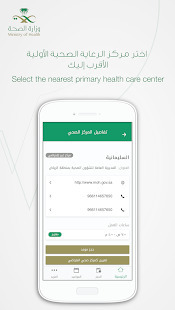



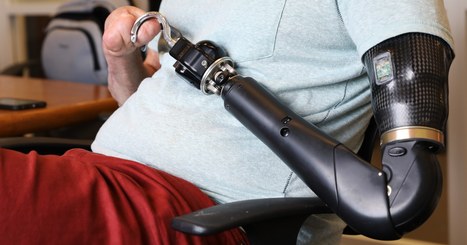


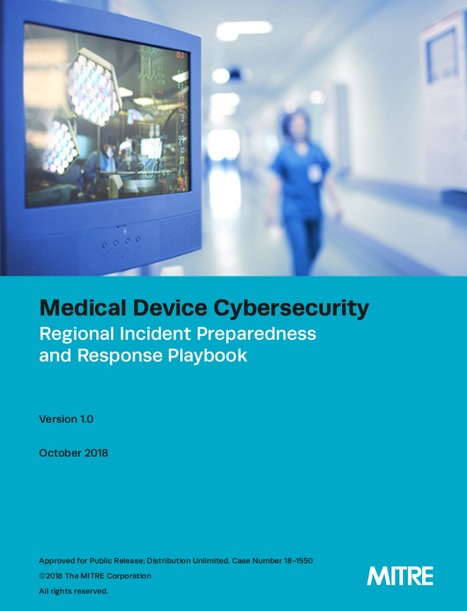
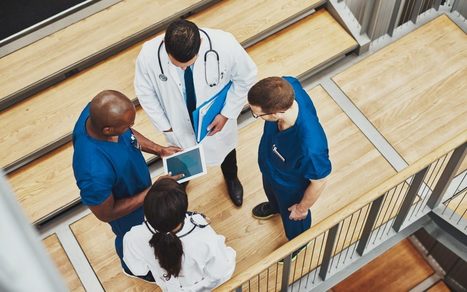
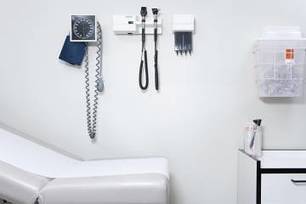





To know why did I posted this PR sounding piece, read the ministers quotes in this post.
E-health will be an essential part of this transformation, and will support it so as to contribute significantly to the improvement of health services and streamline access to such health services,
I think artificial intelligence (AI) will play a huge role in the development of health services in the coming years.
Based on experiences outside the Kingdom, AI gives better results than visiting a physician
That last line was surprising, but having come from the esteemed minister, it sounds promising that Saudi Arabia may end up becoming a hotbed for AI use in Healthcare, and end up helping other nations learn from the mistakes and the success that comes with it.